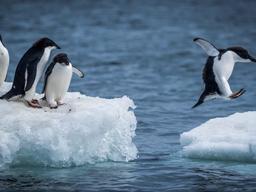
Ecology Quiz
Quiz by Krissya Carranza
Feel free to use or edit a copy
includes Teacher and Student dashboards
Measure skillsfrom any curriculum
Measure skills
from any curriculum
Tag the questions with any skills you have. Your dashboard will track each student's mastery of each skill.
With a free account, teachers can
- edit the questions
- save a copy for later
- start a class game
- automatically assign follow-up activities based on students’ scores
- assign as homework
- share a link with colleagues
- print as a bubble sheet
15 questions
Show answers
- Q1In a forest, two trees are growing next to each other. Which of the following describes two natural resources that both trees compete for in this area?Root length and strengthSunlight and waterAccess to nesting birds and insectsCellular structure and function30s
- Q2When two species with similar needs share a habitat with limited resources, the likely outcome is that -both populations will increasethe resources will increase over timenew populations will enter the habitatthe organisms will compete for the resources30s
- Q3Competition occurs when -resources are abundant and population density is lowthe habitat is large and populations are spread outniches overlap and population numbers are highall populations in an ecosystem occupy different niches30s
- Q4Three-toed tree sloths are mammals which live in the jungle trees of Central and South America. The majority of a sloth’s diet consists of leaves and buds from trees. As rainforest habitats are being destroyed, how will these organisms most likely be affected?A cave dwelling population will appearSome sloths will start to hibernateThe sloth population will likely decreaseMost sloths will become carnivores30s
- Q5Snowshoe hares are related to rabbits and live in cold regions. In warm weather, they have a brown coat and spend many hours feeding on vegetation. To avoid predators they either remain still and try to blend into their habitat, or use their powerful hind legs to flee. What change brought about by the winter season would help these animals avoid predators in the snowy climate?They spend more of the day sleeping.Their brown fur changes to white.Their bodies slow down and require less food.They must search longer to find vegetation.30s
- Q6An event that occurs in a short amount of time-ExtinctionLong-term environmental changeShort-term environmental changeAdaptation30s
- Q7A characteristic or behavior that allows an organism to survive in a changing environment-Long-term environmental changeAdaptationExtinctionShort-term environmental change30s
- Q8Deforestation and volcanic eruptions are examples of-long term environmental changesExtinctionadaptationshort term environmental changes30s
- Q9In short term environmental changes organism have _______________________more resourcestime to competetime to adaptno time to adapt30s
- Q10The place or environment where a plant or animal naturally or normally lives and growsCompetitionNichePopulationHabitat30s
- Q11How many more lemmings are there than weasels during the peak of the lemmings population?10020015023030s
- Q12Species not native to a specific environment that causes ecological and economical harmIntraspeciesPredatorsInvasive speciesParasites30s
- Q13The variety of all life forms on EarthNicheInvasive speciesBiodiversityPopulation30s
- Q14Soil composition, water, light and shelter are all examples ofNicheAbiotic factorsBiotic factorsBiodiversity30s
- Q15Who is Ms. Carranza's Husband?AquamanBatmanFlashSuperman30s